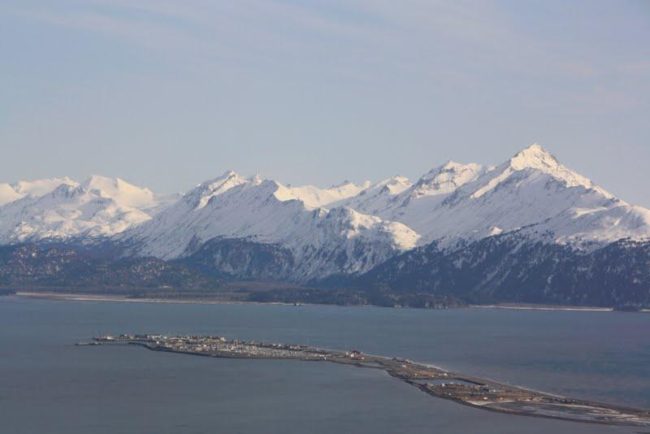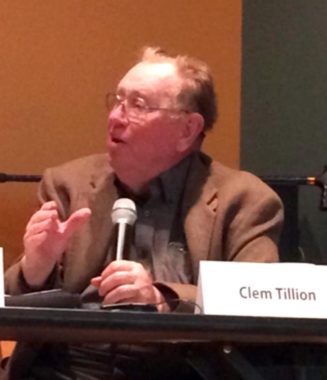
(Photo courtesy of KBBI)
The environmental nonprofit Cook Inletkeeper sponsored a panel discussion to commemorate the 40th anniversary of the Kachemak Bay oil and gas lease buyback. The buyback prevented oil and gas development in the Bay and protected it as a critical habitat area.
“It was a story. It was a David and Goliath; a little town in Homer at the end of the Sterling Highway, is under pressure from those big oil companies,” said Frank Tupper, who helped found the Kachemak Bay Defense Fund.
In one corner was David: a motley crew of commercial fisherman, Homer’s budding environmental movement — including Tupper — and other Homer residents desperate to protect Kachemak Bay. In the other were oil companies and the state of Alaska, which in December 1973 held a Lower Cook Inlet lease sale that opened up the bay to drilling and production activities.
What followed was a three-year battle fought in all three branches of state government and all aspects of the community. On May 25, Cook Inletkeeper sponsored a panel discussion to commemorate the 40th anniversary of these events.
“It was a local, human-scale fight over our human destiny with great characters and great arguments on all sides,” said Tom Kizzia, editor of the Homer News at the time,” said journalist, Tom Kizzia.
“Homer really changed as a consequence of what happened in that period. I think you can see a lot of what Homer became, was seeded and started to grow at that time,”
The seeds of environmentalism flourished from the fight, and the community became centered on tourism and fisheries, rather than oil and gas.
Loren Flagg was the commercial fisheries area biologist for Fish and Game when the lease sale was announced, and had all of two days to prepare comments.
“At that time the bay was producing 5 million pounds of shrimp a year, 2 million pounds of king crab, a half million pounds of tanner crab, and, of course, salmon, halibut. It was extremely, extreme(ly) valuable resources,” said Flagg.
But Gov. Bill Egan supported the sale, so it went ahead, much to the surprise of Homer residents. The sale had been announced through the usual governmental and industry channels, but not in a way that reached community members. Ken Moore fished crab, herring and salmon in the bay. He says fishermen felt like they didn’t have a say in the matter.
“No effort to find out if the people whose front yard it was all going to be in wanted it there. Or it didn’t seem that anybody really cared whether they did or not, it had happened already. And that just added insult to injury when you discovered what was going on,” said Moore.
Frank Tupper was making ends meet as a self-proclaimed hippie at the time, when a friend came by his trailer to tell him about the pending lease sale.

(Photo by Jenny Neyman/KBBI)
“Neither one of us could believe that that would be possible, that people were not that stupid, that they wouldn’t just do it just for the dollars. Naïve we were, but, still, that’s what we thought because of this beautiful, intrinsic area that we live in. So I think I said to Chuck, ‘Well, dammit, there’s two of us, let’s get going.’ From the citizen side of it that was the beginning of going out and just beating the streets and talking to people, ‘Do you know what’s coming, do you know what’s coming?’” said Tupper.
Such was the grass roots of the community campaign that eventually gained national attention. Activists established the Kachemak Bay Defense Fund, led by Tupper. They joined forces with the North Pacific Fishermen’s Association, led by Moore, to spread the word of the oil incursion into the bay and raise money for a legal battle.
A popular tactic was to hold shrimp and crab feeds, serving up information and donation forms along with the shellfish.
“I would hold up a quart of oil and I would say — after they were wiping their mouths with the butter and the garlic and everything — I said, ‘Now, which would you prefer in the bay?’” said Tupper.
The fund helped pay for legal challenges to the leases. The issue made it to the Supreme Court. Warren Matthews was an attorney for the plaintiffs. They brought three challenges: Failure to give notice — they lost on that one; failure to make a reasoned decision that the lease sale was in the best interest of the state; and failure to conduct a study of potential impacts to be shared with affected communities. The court found merit in those two claims, but not enough to reverse the sale.
“A majority of the court said, ‘Well, you’re right, but do we want to disturb all these other leases that have been made in the past?’ They answered, ‘No. Therefore, we’re not going apply this ground to you, either,’” said Matthews.
But political tides were changing. Republican Jay Hammond was elected governor in 1974, in part on his conservationist platform to protect fisheries.
Homer fishermen, environmentalists and others had been fighting to protect Kachemak Bay from development after the state of Alaska held a lease sale for oil and gas exploration.
“We were fighting for our homeland; we were fighting for the bay, the intrinsic beauty of the area. So it wasn’t just a bunch of people with an ‘ist’ at the end — conservationist, environmentalist, developmentalist. It was people. People from a little town that had a common goal, and we fought like hell,” said Frank Tupper, of the Kachemak Bay Defense Fund.
Tupper’s group raised money to bring a legal challenge to the leases. Though the Supreme Court agreed with some of their arguments, it offered no practical relief, not wanting to step on a slippery slope that could affect many other leases already issued.
That left the state’s lawmakers and administration to settle the issue. Gov. Hammond submitted a bill to the Legislature in 1976 calling for a one-year moratorium on oil drilling in the bay, in which time the state could negotiate with the oil companies to buy back the leases. After that year, the state could reacquire the leases through eminent domain. Going forward, Kachemak Bay would be protected as a critical habitat area.
It was not an easy sell in the Legislature, with many Democrats still loyal to Gov. Bill Egan, who authorized the sale, or supportive of industry development in the state. Republican Legislator Clem Tillion, from Halibut Cove, was one of the main champions of the bill, both to protect fisheries and because the oil industry only paid 1 percent severance tax at the time. New legislation would impose taxes on the oil industry similar to what Texas required.

(Photo by Jenny Neyman/KBBI)
“Why would I give up one fish for something that doesn’t pay me anything? Those are my grandchildren and great-grandchildren’s resources. But I’m certainly not going to give it away,” Tillion said.
Chancy Croft was a Democrat lawmaker, but on the same side of the issue.
“By ’75 you had a Republican governor and a Legislature that was overwhelmingly Democrat. And, so, the question was, ‘Were a group of Democrats going to say that the former Democrat governor of Alaska was wrong in what he did?’ It turned out a majority were willing to say that,” Croft said.
As the clock wound down in the 1976 legislative session, Tillion was short three votes to get Hammond’s bill passed. Ironically, the oil industry provided the extra push needed.
The jack-up rig George Ferris had been towed to Mud Bay, along the Homer Spit, for repairs after it was damaged at Cape Kasilof early that year. By August, rumors were flying that the rig’s iron legs were stuck in the mud. In May, Shell Oil attempted to move the rig, but the legs failed to retract and the rig got swamped by the tide, spilling diesel fuel into the bay. The oil boom meant to contain any possible spills was stuck on deck. Another boom brought in to contain the spill turned out to be already dirty and released its own sheen into the water.
Kizzia, editor of the Homer News at the time, covered the fiasco.
“To this day you can find plenty of quotes from industry officials about the care that they were going to take if drilling went ahead. And as soon as there was actual trouble all the promises evaporated,” said Kizzia.
Most anyone on the fence about protecting the bay was pushed over by the resulting outrage.
“One of the biologists with Chevron testified that it would not be possible to spill enough oil to do harm in Kachemak Bay,” said Loren Flagg, the commercial fisheries area biologist for Fish and Game at the time. “As the Legislature was getting ready to vote, the George Ferris. And that was enough for the Legislature to change their votes.”
Homer was indelibly changed by these events, and those involved learned lifelong lessons.
“Trust but verify. Don’t take everything you hear,” said Flagg.
“Don’t give away that which lasts forever for something that’s going to be here a short time,” said Tillion.
“The belief in people power, in self-advocacy, in the strength that you as an American citizen has,” said Tupper.
The panel discussion panel discussion to commemorate the 40th anniversary the Kachemak Bay oil and gas lease buyback took place on Wednesday, May 25 at Islands and Ocean Visitor Center in Homer. Cook Inletkeeper plans to make a full recording of the discussion available on its website, at inletkeeper.org.
Editor’s note: In 2014, Soldotna Sen. Peter Micciche sponsored legislation that removed the area around the deep-water dock on the Homer Spit from the critical habitat area, allowing drill rigs to dock at the Homer port. Cook Inletkeeper objected to the change, but there was overwhelming political support and the legislation passed.
